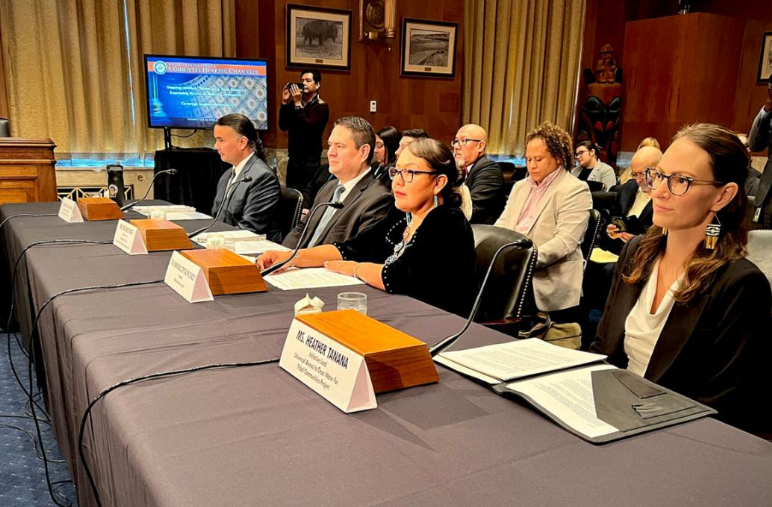
- Details
- By Levi Rickert
Navajo Nation Council Speaker Crystalyne Curley on Wednesday, September 27, 2023, made testimony before the U.S. Senate Committee on Indian Affairs’ “Water as a Trust Resource: Examining Access in Native Communities” oversight hearing.
She said about 30 percent of homes on the Navajo Nation, the country’s largest Indian reservation, lack running water
The hearing was led by U.S. Senator Brian Schatz (D-HI), chairman of the Senate Committee on Indian Affairs, and U.S. Senator Lisa Murkowski (R-AK), vice chairman of the Committee. The hearing heard testimony on two bills, S. 2385 and H.R. 4746, titled "Tribal Access to Clean Water.”
“Our Navajo people often say that ‘water is life’ and we fully understand the sacredness of this precious resource. Unfortunately, approximately 30-percent of Navajo Nation homes lack running water,” Curley testified.
She said the lack of access to water includes more than a domestic water supply. It impedes economic development on the Navajo Nation.
“Water is needed to support farming, industrial development, and municipal development,” Curley said. “There are no federal programs to address water access for economic development and therefore the settlement of our water rights cases has served as the vehicle for obtaining sufficient federal funding and authorization as necessary to design and construct clean drinking water projects that will promote economic development by serving businesses, government buildings, and other municipal needs.”
Curley also noted that one of the most important ways that Congress can support the Navajo Nation is by helping to enact legislation to approve and implement water rights settlements that have been negotiated with states, the federal government, and other stakeholders.
“Through these settlements, the Navajo Nation can secure more reliable water supplies by quantifying our reserved water rights and obtaining support for infrastructure projects needed to put those water rights to use to benefit the Navajo people,” Curley said.
Sen. Schatz said ensuring water access is not just the right thing to do, but it’s the federal government’s trust and treaty responsibility.
“For too many Native communities, the total lack of access to clean and safe drinking water and sanitation facilities is an everyday reality,” Chairman Schatz said. “Ensuring water access is not just the right thing to do, it’s the federal government’s trust and treaty responsibility. It’s our legal obligation – not just to reserve water rights – but to live up to our promises and take affirmative steps to secure this access to the best of our ability.”
The hearing also included testimonies from U.S. Assistant Secretary of Indian Affairs Bryan Newland and IHS Deputy Director Benjamin Smith.
The full video of Wednesday’s oversight hearing is available here.
More Stories Like This
Native News Weekly (August 25, 2024): D.C. BriefsUS Presidents in Their Own Words Concerning American Indians
Native News Weekly (January 4, 2026): D.C. Briefs
What Native American Members of Congress Are Saying about the Venezuela Operation
Ramos Measure Seeks to Prevent Suicides at High-Risk Bridge Sites
Help us defend tribal sovereignty.
At Native News Online, our mission is rooted in telling the stories that strengthen sovereignty and uplift Indigenous voices — not just at year’s end, but every single day.
Because of your generosity last year, we were able to keep our reporters on the ground in tribal communities, at national gatherings and in the halls of Congress — covering the issues that matter most to Indian Country: sovereignty, culture, education, health and economic opportunity.
That support sustained us through a tough year in 2025. Now, as we look to the year ahead, we need your help right now to ensure warrior journalism remains strong — reporting that defends tribal sovereignty, amplifies Native truth, and holds power accountable.
 The stakes couldn't be higher. Your support keeps Native voices heard, Native stories told and Native sovereignty defended.
The stakes couldn't be higher. Your support keeps Native voices heard, Native stories told and Native sovereignty defended.
Stand with Warrior Journalism today.
Levi Rickert (Potawatomi), Editor & Publisher


